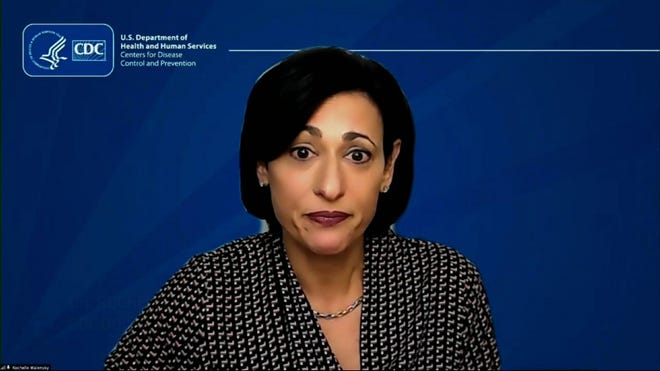
This article is more than
4 year old
WASHINGTON – Five states have announced rolling back mask mandates in major recalls of COVID-19 safety measures over the past month – leaving many to wonder whether other states will join the tide and alter how the country is dealing with COVID-19 at a crucial moment in the fight against the disease.
But like so much with the pandemic, the path ahead is unclear. Cities, businesses and families are often making their own choices of whether to wear masks or go to restaurants, despite governors in Alabama, Mississippi, Texas, Montana and Iowa declaring that state mandates would no longer be needed to prevent the spread of COVID-19.
Major American retail chains across the country such as Kroger, Best Buy Co., Kohl’s and Ulta are sticking to their policies to require masks in stores. Some local mayors are telling residents to ignore the words of their state governors.
The mixed messaging has become another unfortunate reality of COVID-19's impact. Several states that never enacted mask mandates still had communities and businesses that required them, creating a dizzying environment for residents navigating different rules. The confusion has even led to violent confrontations over the months.
More:US coronavirus map: Tracking the outbreak

Governors in Texas and Mississippi announced Tuesday that they would halt mask mandates and reopen their states, allowing businesses to operate at full capacity. They were followed Thursday by Alabama Gov. Kay Ivey, who announced she would extend the state's mask mandate until April 9 – but allow it to expire after that date and instead make mask wearing optional.
Ivey said the decision to extend the order until next month would allow businesses to make appropriate decisions and preparations after the mandate expires.
Texas Gov. Greg Abbott said Tuesday that he was moving to "open Texas 100%" and would issue an executive order that would take effect March 10 rescinding most of his earlier orders, including restrictions on business occupancy and the July 2 statewide mask order.
Mississippi Gov. Tate Reeves tweeted Tuesday that starting Wednesday, all county mask mandates would be lifted and businesses allowed to operate fully. Hospitalizations and case numbers have plummeted, and the vaccine is being rapidly distributed, he said: "We are getting out of the business of telling people what they can and cannot do."
Earlier this month, governors in Iowa and Montana announced they, too, were rescinding mandates on wearing masks. The five states join 12 others that either never had mask mandates or have since rescinded such policies.
More:Texas isn't alone. These 15 states also do not currently have a statewide mask mandate.
More:Gov. Kim Reynolds lifting Iowa's mask requirements, gathering limits Sunday
More:Alabama Gov. Kay Ivey makes final extension of mask order; some COVID restrictions loosened
Nationally, the number of COVID-19 cases has steadily declined over the months, but experts say the decline appears to have plateaued, which only heightens concerns of relaxing mitigation efforts. Some have also pointed to widespread snowstorms, notably in Texas, where residents weathered through intense freezing temperatures and lost access to power and water, as a possible factor in the dip in reported cases.
In Mississippi, as Reeves made the announcement, about 300 new COVID-19 cases were reported and 44 deaths from the disease. The state saw its highest numbers in January, where in a single month 1,240 deaths were reported. On Jan. 7, the state reported a single-day record of 3,255 new cases of the coronavirus.
It's a similar picture in Texas, which also saw its highest numbers in winter.
On Tuesday, 275 new coronavirus deaths were reported and more than 7,200 people tested positive for the virus. That is far less than the 22,000 people a day who were testing positive in January.
Public health experts widely condemned the moves by Texas, Mississippi and other states, warning of the effect such policies could have on the rest of the country.
Eric Rubin, an infectious diseases specialist at the Harvard T.H. Chan School of Public Health, said, "What they do in Texas matters to everybody else in the country." He noted that the state is the second-most-populated in the country and has the second-most coronavirus infections since the start of the pandemic.
Rubin said he understood the daunting task for states examining whether to reopen their economies, though he noted the partial reopenings in various parts of the country over the months have largely been "counterproductive" to ridding the country of the virus.

More:President Biden on states lifting mask mandates: 'The last thing we need is Neanderthal thinking'
But, he argued, reopening businesses, schools and other entities has nothing to do with wearing a mask.
"The part that doesn't make any sense at all is the masking part," Rubin said. "There's no economic reason to not wear masks ever."
Joseph Fauver, an associate research scientist in epidemiology at the Yale School of Public Health who has been studying variants of the virus, said relaxing such restrictions could be "encouraging more risky behavior at a time when transmission risk is still very, very, very high."
Fauver noted this is a crucial moment for the country: Vaccinations are ramping up while variants continue to spread across the country. He said that includes Texas, where the CDC has tracked the spread of two mutated variants of the virus, one of which Fauver said is "circulating at a really high level."
"Pulling back now is premature," he said. "It's dangerous and will result in more deaths."
The message was echoed at the White House on Wednesday by CDC Director Dr. Rochelle Walensky. "I do think that the next month or two is really pivotal in terms of how this pandemic goes," she said. "As we scale up vaccination, we really do need to decrease the amount of virus that is circulating."
Rubin agreed, adding that the mix of vaccinations and more variants emerging is a fearful combination, especially if states are easing restrictions on precautions such as masks. As more people are vaccinated, the virus is likely to continue mutating so it can continue spreading, he said.
"The virus is changing a little bit all the time," he said. "And when it starts encountering people who have immunity, then, one worries that it's going to accumulate mutations that let it get around immunity."

More:What we know about face masks has changed. Here's what experts say and which states mandate masks
The notion of easing precautions "just feels like so the wrong time," he said, and puts the rest of the country at risk for continued spread, though he noted many are feeling ready to ease restrictions after seeing cases drop and vaccinations continue.
Rubin acknowledged some might support the idea of getting back to normal after seeing cases drop and vaccinations continuing, but the better way of looking at it, he said, is: "Hey, we're about to get there. We're so close. Let's not screw it up now."
But even as President Joe Biden has promised the U.S. will have vaccinations for every adult by May, the path to going back to normal is anything but certain. Rubin noted some of the public health measures that have changed Americans' everyday lives, such as social distancing and masks, probably will continue even after more Americans are vaccinated.
Experts say easing restrictions will be guided by several factors: vaccinations in any particular area, rate of transmission and the spread of variants.
It wasn't long after governors in Texas and Mississippi announced rescinding their mask mandates that local community leaders and businesses said they would continue to enforce their own mask rules.
In Mississippi, a number of cities pledged to continue requiring masks despite the governor's announcement. The city of Jackson's mask mandate will continue, Mayor Chokwe Antar Lumumba said Tuesday afternoon.
"When health experts are telling us to still mask up and increase protective measures, it doesn't stand to reason to be going in the other direction," he said.
More:Despite Gov. Reeves' order, Jackson mayor says mask mandate still in effect
In Hattiesburg, about 90 miles southeast of Jackson, Mayor Toby Barker announced that the city would also remain under a mask mandate "for the foreseeable future."
"Even if you're tired of masks, do the right thing," Barker said. "Do right by your family, friends, neighbors, co-workers, fellow church members, people in your life that need to be protected."
A number of businesses in Texas and Mississippi did the same, including some of the nation's largest retailers, insisting they would continue their mask policies regardless of state policies.
Austin-based grocer Fresh Plus, which has three stores, said it would keep enforcing its mask policy.
"We will continue to require all shoppers and employees to wear masks when inside the store," said Averey Robertson, manager of the chain's Anderson Lane store. "The sign on our door says 'Masks required to enter,' and that will stay the same."
More:Uncertainty, anger, joy: Texas Businesses react to Abbott dropping mask mandate
Kroger, which also owns supermarket chains including Ralphs and Dillons, said in a statement to USA TODAY that it would "continue to require everyone in our stores across the country to wear masks until all our front-line grocery associates can receive the COVID-19 vaccine."
Best Buy Co., Kohl’s and Ulta told Bloomberg News that they're sticking with their mask requirements. CNN added CVS and Walgreens pharmacies, and auto manufacturers Toyota and General Motors to the list.
But not all. Some retailers including Albertsons plan to stop requiring patrons to wear face coverings.
"For associates and vendors, we will continue to follow the CDC guidance and will require face coverings. For customers, we will encourage face coverings to be worn while in the store," Albertsons told USA TODAY.
And that has largely been how businesses and communities have handled COVID-19 policies in other states without mask mandates. The hodgepodge of mandates vary from state to state, city to city and store to store, confusing customers and escalating tensions.
Skirmishes between unmasked customers and retail staff and security guards in Texas surfaced online this week. Last year a security guard was shot and killed in a dispute at a Family Dollar in Flint, Michigan.
But the changes in Texas, Mississippi and Alabama aren't likely to lead to a new array of lawsuits. Businesses largely have rights to institute rules, such as wearing shoes when entering.
The only real hiccups could arise over blanket policies that don't include provisions for those with disabilities or medical conditions or policies that aren't being required uniformly of everyone, said Tina Bullock, an attorney in Mississippi for the Milberg Coleman Bryson Phillips Grossman law firm and a former nurse.
"Businesses have rights, too," Bullock said, noting it's a balancing act of weighing protections for patrons and the rights of others.
Contributing: Jessica Guynn, USA TODAY; Lori Hawkins and Matthew Odam, Austin American-Statesman; and Sarah Haselhorst and Gabriela Szymanowska, Mississippi Clarion Ledger